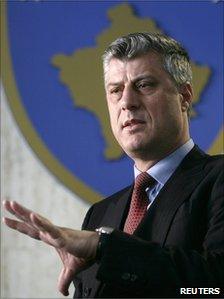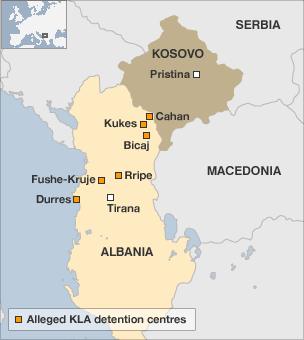Kosovo rejects Hashim Thaci organ-trafficking claims
- Published

Kosovo PM Hashim Thaci is named 27 times in the highly critical report
The Kosovo government has reacted angrily to a draft report alleging that serving leaders are responsible for crimes including organ-trafficking.
The Council of Europe report names Hashim Thaci - prime minister and wartime political leader of the Kosovo Liberation Army (KLA) - 27 times.
The human rights body's inquiry reinforces several aspects of a 2009 BBC report into similar allegations, external.
Kosovo's authorities have rejected the claims as "baseless and defamatory".
The draft report, which is due to be published on Thursday, is the result of a two-year investigation by the special rapporteur of the Council of Europe, Dick Marty.
The EU's police and justice mission in Kosovo (Eulex) said it would look carefully at its findings.
Detention facilities
Allegations of organ-trafficking against the KLA were first published by the former prosecutor of the Hague International War Crimes Tribunal, Carla del Ponte, in 2008.
The BBC's report presented evidence of the cross-border transfer of both Serb and Albanian prisoners of the KLA from Kosovo to Albania.
Nick Thorpe, who was involved in the BBC investigation, external, says that Mr Marty's report identifies individuals and joins the dots between known detention facilities used by the KLA during and after the war in the late 1990s.
The Drenica group within the KLA, which was led by Mr Thaci, is accused of involvement in organised crime, including drug-trafficking and the trafficking of human organs.
Leaders of the group are also said to bear "the greatest responsibility" for running the "KLA's ad hoc network of detention facilities" inside Albania as well as determining the fate of prisoners.
Evidence is also presented of organised crime activities continuing up to the present day.
Mr Marty's report argues that the abuses were sufficiently widespread to constitute a pattern in neighbouring Albania as well as in Kosovo.
It suggests that at least six detention centres operated in Albania and it adds that prisoners continued to be detained after the end of the 1999 Kosovo conflict.
Organ removal
In addition, it says, a "state-of-the-art" reception centre was used for the removal of captives' kidneys as part of the organised crime of organ-trafficking. Mr Marty's sources allege the organs were shipped out to private overseas clinics.

The report also appears to corroborate allegations of crimes, mainly against ethnic Serbs, at a farmhouse in the Albanian village of Rripe known as the "Yellow House".
The Yellow House allegations were contained in a joint investigation by the BBC and the Center for Investigative Reporting.
The draft Council of Europe report says a small number of deaths occurred there and goes on to claim that the house was used as a transit point where victims were processed according to their physical condition.
The end point, the report alleges, was at Fushe-Kruje where victims were killed and their organs removed. The report notes its proximity to Albania's main airport near Tirana.
Destroyed evidence
Mr Marty's draft report is particularly critical of the UN War Crimes Tribunal in the Hague which, he says, carried out an exploratory mission to the Yellow House site in Rripe.
While pointing out that the tribunal did not have jurisdiction over Albania, the report complains that its initial investigation into organ-trafficking was dropped and evidence taken from the Yellow House destroyed.
The Hague chief prosecutor's special adviser, Frederick Swinnen, told the BBC News website that investigators had decided that the evidence found was "limited and inconclusive" and "was not going to be used in our trials and our cases". However, he added that a record of it had been kept.
In its first reaction, the Kosovo government warned of legal and political steps against what it described as "slanders".
Spokesman Memli Krasniqi said the allegations had been investigated several times by local and international prosecutors, and the claims were found to be unsubstantiated.
"To us it's clear that someone wants to embarrass Prime Minister Hashim Thaci after the landslide victory in last Sunday's parliamentary elections," he said.
Mr Thaci, whose political party won Sunday's parliamentary elections in Kosovo, said in a 2009 interview that certain individuals might have abused the uniform of the Kosovo Liberation Army but, if so, these were isolated incidents.
After a meeting in Moscow, Serbian Foreign Minister Vuk Jeremic cast doubt on the Kosovo prime minister's political future in light of the Council of Europe's draft report.
Andy Sparkes, deputy head of the EU's police and justice mission in Kosovo, said that if the Council of Europe had "chapter and verse on this kind of thing, then obviously we would like to hear from them more formally so that we can deal with it".
The report is due to be presented to the legal and human rights committee of the Council of Europe in Strasbourg on Thursday.
- Published12 November 2010
- Published27 May 2010